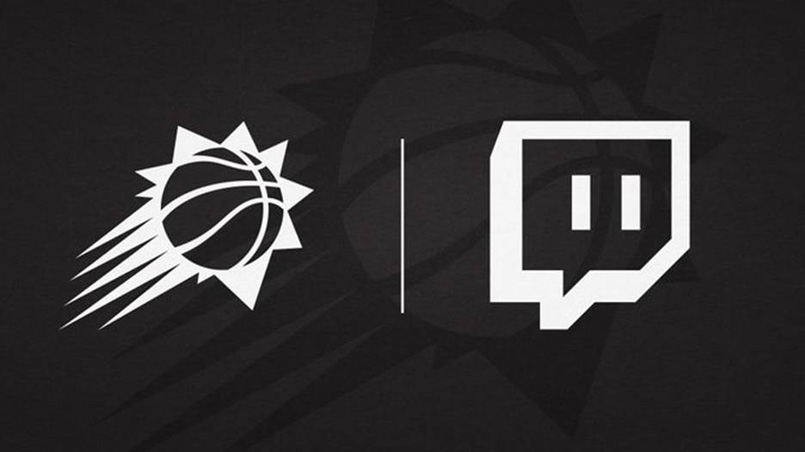The lockdown on sports events has forced everything from motoracing to cricket to embrace their closest video-game tie-in. While some have done so with more fanfare than others, Arizona’s own Phoenix Suns were among the fastest to hit the virtual hardwood; building full events around NBA 2K matchups that included sports celebrities, live giveaways, and local TV and radio broadcasting.
“I’m not going to share a dollar amount, but every game has commitments, everything from in-arena, t-shirt tosses, kiss cams; you can count the list,” Dean Stoyer, chief marketing & communications officer for the Suns, told The Esports Observer. Although sports simulations can’t replace every branded segment in a real game, playing the rest of its regular-season games in NBA 2K has allowed the Suns to fill in commercial spots, interviews, and reshare highlight moments on social media.
A set of video game streams on Twitch may not provide apples-to-apples comparisons with nationally broadcasted games, but according to Stoyer, the impressions across all platforms have ranged from 2.1M to 3.1M. In some cases, the numbers are 10 times bigger than what the organization would have gotten from airing a basketball game on Fox Arizona or radio.
“Due to the current situation we have a captive audience, but it was how quickly we moved,” Stoyer noted, adding that the Phoenix Suns were running games even before the NBA announced its own NBA 2K players-only charity invitational, which it would ironically go on to win. “If we had not, we would’ve lost momentum and the opportunity to capitalize on that audience.”
Less than a day after the NBA regular season was postponed on March 11, the Suns’ social media team were already moving onto what would be a defining content strategy for the foreseeable future. One of the big draws is that, in some weeks, the Suns players are passing the controller to professional players from neighboring NFL and MLS franchises.
Another assist for The Valley.
Crowned as the first-ever @NBA2K Players Tournament Champion; #FirstRespondersFirst and @aafb will receive $100,000 in Book’s name. pic.twitter.com/LdgdGcHdic
— Phoenix Suns (@Suns) April 17, 2020
“When you have a broadcast that gets that kind of engagement, when you’re running advertisements on it, we can go back to the partner and not only show them the results, but also show them a new area of opportunity that we created from the circumstances, and something we should consider moving forward once we get past COVID-19,” said Allison Harissis, social media senior manager for the Suns.
Oddly, the Phoenix Suns are one of the eight NBA franchises that have not yet joined the official NBA 2K League; an esports joint venture between the NBA and Take-Two Interactive (currently postponed due to COVID-19). Stoyer said joining the competition had been on the table before the lockdown, and while the positive impact of its virtual broadcasts may make entry more attainable, he adds that not having an esports franchise meant the Suns were free to approach gaming in its own way.

“We approached it, purely from a broadcasting perspective, that this was a new channel for us,” he said. “You don’t have ten guys or ten women on the court; you got a couple of gamers or influencers, but you’re still broadcasting a game.”
The Suns have even discussed hosting watch-and-win collaborations with local Arizona restaurant partners; offering discounts for pick-ups and deliveries. “If we were to get into that space, it would be paramount for us to carry on looking at things differently, not falling into what every organization does with its esport team,” added Stoyer.
The setup and streaming of the NBA 2K games was achieved with local esports production company SAK Gaming. One of the more unexpected destinations was 98.7 FM Arizona’s Sports Station, which would air post-recorded coverage with play-by-play commentator Jon Bloom and color analyst Tim Kempton.
“Esports on the radio” is a largely unheard of concept; the closest recorded instance is fans in the early 2000s listening to Dota match commentary while on the go; at a time when it had to be synced manually with game broadcasts.

“We started watching Twitter closely after the first couple of streams went live, just in regards to the cross-pollination of audiences,” said Harissis. “It’s not only a way for us to engage our fans, but a way for us to test and expand our audience outside of the Phoenix market.”
The Suns closed out its virtually simulated season against the Houston Rockets last week, with its opponents represented by MLB Network host and gaming personality Robert Flores. Like most other NBA franchises, the team is planning a content package of re-runs of classic games as the COVID-19 lockdown dredges on. When basketball stadiums are up and running again, it’s unlikely the video game counterparts will receive as much attention, but that’s not to say they won’t play a larger role in team marketing.
“It’s opened up a new door for us,” said Stoyer, adding that while nothing definitive was planned at this point, there’s potential with the postponed WNBA season, and the franchise’s own Phoenix Mercury team.
“Our basketball season is pretty much around the clock,” he said. “How do we maintain both, and how does this supplement a regular season? On the charitable side there’s thoughts there, broader fan engagement, getting our fans closer connected, even if it’s through the virtual world.”


